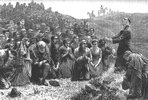MichaelNZ
Puritan Board Freshman
"Every man who prays or prophesies with his head covered dishonors his head" (1 Corinthians 11:4 ESV)
Does this verse mean that men who wear hats have to take them off to pray? I usually wear a flat cap when I go out and if I want to pray, I take the cap off. Is this verse applicable to men today (since the majority of women in my church don't wear headcoverings which are mentioned in the next verse) or was it something cultural that no longer applies today?
Does this verse mean that men who wear hats have to take them off to pray? I usually wear a flat cap when I go out and if I want to pray, I take the cap off. Is this verse applicable to men today (since the majority of women in my church don't wear headcoverings which are mentioned in the next verse) or was it something cultural that no longer applies today?

